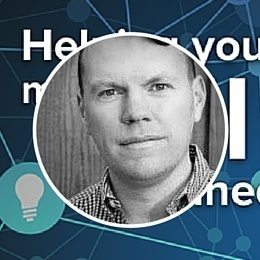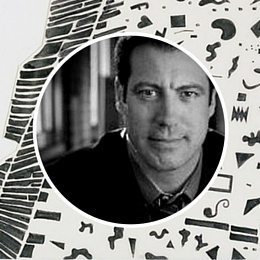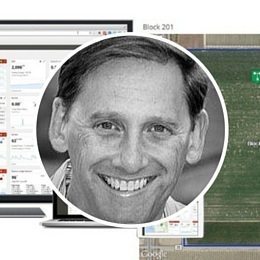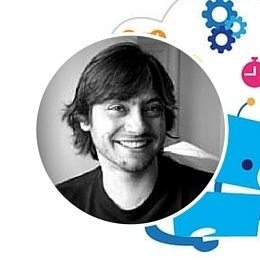Rob van Kranenburg the founder of the Internet of Things Council discusses how the IoT will impact tax codes, payments for goods, and even the concept of money itself, Open data / open source systems and 4 layers of the IoT ecosystem, and how people’s views on the topic have shifted in 10 years time.
This is the 4th segment in the Postscapes Interview Series with some of the top people influencing the Internet of Things.
Interview:
Who are you, and what do you do?
I am Rob van Kranenburg and I write and read in Ghent, Belgium. I studied literature in the Netherlands, I am Dutch. I then went to work on hypertext and educational websites at the Department of Teacher Traning in Ghent and the University of Amsterdam, as coordinator of the New Media Lab in 2000. For the past ten years I have been mainly self employed. As my key understanding of the world is messy and poetic I have learned to harness my ideas in projects, formats, courses in all kinds of jobs at a lot of different key places that deal with the introduction and mediation of new technologies in society. From policy to project management, from Flow editor to Doors of Perception in 2002 on the design challenge of Pervasive Computing to Head of Society at the Dutch lab Waag Society. Currently I am most busy with Council, the think tank for Internet of Things that I founded in 2009. I will also be busy soon with a Paris based startup called CKAB that aims to roll out physical combinations of hacklabs and edgy spaces.
How do you view the term “Internet of Things”?
It is the most apt, the most telling. Ambient Intelligence, Pervasive Computing, Ubicomp are all backed by industry one time or another and although they all point to seamless connectivity hidden somewhere in the environment, what captures the essence of smart connectivity is ‘the internet’ as a backbone and ‘things’ as the objects that surround us daily.
Where do you see the Internet of Things and its technologies creating the most impact?
In a very positive global governance if what I and other people work for will work out: without governments, inefficient layers of organizations, military apparatus and all this needless competition and bullying; just good services that cater to the real costs of Climate Change. Imagine that hidden in your smart phone are the global protocols that work as a decentralized network of networks. You pay for real use (of streets, of sewage systems, of lights when you bike home in the dark) and in the protocols that inform the algorithms that start up your applications some form of generic taxes is running smoothly along: 10% for Climate Change, 10 for plants and 10 for animals, 10 for food for everyone. It is not as if this is impossible.
Now if this does not work out, then I’m afraid we will see about 500 military zones called smart cities and Mad Max in between. Best gear up your fablab to that situation.
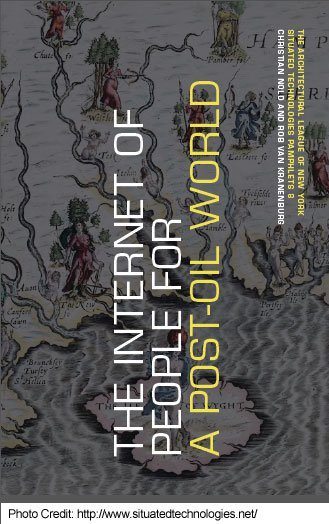
What are you currently working on or are most excited about?
I am working on a panel for Open World Forum in Paris later this month. I am quite excited about this argument:
IoT can be broken down into 4 layers. A value chain where all objects can be tracked, logged and traced (much like the barcode standards). A service layer will be build on this, currently mostly by the mobile operators who will be offering filtering layer deals to customers just as they do now with sms/gsm. In a world where the batteries in your blinds are keen to text you when they run out, you better have some good filters. On top of this layer – and currently interwoven in it through the public private partnerships – we find the smart city layer. The ultimate limit and scope of IoT the Sensing Planet idea where all natural processes are captured by enormous globally distributed sensor grids and have a counterpart in the cloud.
If there is no integrated vision on decentralized systems, alternatives to global naming schemes, open hardware and middleware then the future is that the four layers will operate seamlessly interoperable but mostly if not entirely closed. Free/Open Source means that there has to be an alternative to closed systems on all four layers. With this panel and with CKAB the idea is to start working on open source IOT on all layers.
I am also very happy with a project that Council is starting with dyndy.net, as IoT is about new, alternative and radical currencies and forms of payment. In a full IoT there will be no more POS/POT, points of sale or transaction as there is so much contextual information that you are wearing that shirt that the cost of it will be deducted somehow from some repository where you have stored certain credit. The very notion and nature of money itself will be transformed. It was an interesting idea in the days of Gutenberg. There is no more need for it now. Needless to say that full IoT means the end of black markets, corruption and tax evasion.
In that respect I guess the most exciting project (albeit in a very early and uncertain stage) that we are starting is with the innovation consultants from the Dutch Belastingsdienst (Tax Administration) who are very open and innovative about rethinking the notion of taxes in the potential that is offered by Internet of Things.
For me personally this trajectory is important as I have moved in ten years time from having only negative arguments about what should be done (the breakdown of the system that can not deal with the data tsunami and as a result will start more disciplining leading in turn to more evasive and parallel actions by smarter and smarter citizens) to positive ones in arguing that in order to get a full IOT all databases – including military and intelligence – should be opened to all end-users, that is all citizens. It is an elegant argument that says: I have a very banal and simple life, I have nothing to hide, please look at all my data. Now, can I look at yours?
Shout-outs: Any sites/people/articles or books that have inspired you lately?
The best decision in that respect was deleting my Facebook account on January 1 this year. Half a year later I have gained the rest and agency again to sit and read a book. Man! What joy. I had forgotten what that was like as I was using all my in between time on FB. As I am online basically all of my waking time reading about IoT, media, smart objects, interactive design…I try to read poetry, the old philosophers of which Nietzsche is my favorite (Ecce Homo is a must), the John Wyndham novels that are very inspiring and commenting upon current events (try Midwich Cuckoos) and when I feel I need it I go to this one coffee house in Ghent to read the Thorgal comic books.
Your readers however could start with the essay that Christian Nold and I wrote earlier this year: The Internet of People for a Post-Oil World.
Thanks for taking the time to talk to us and looking forward to following all of your new projects.

